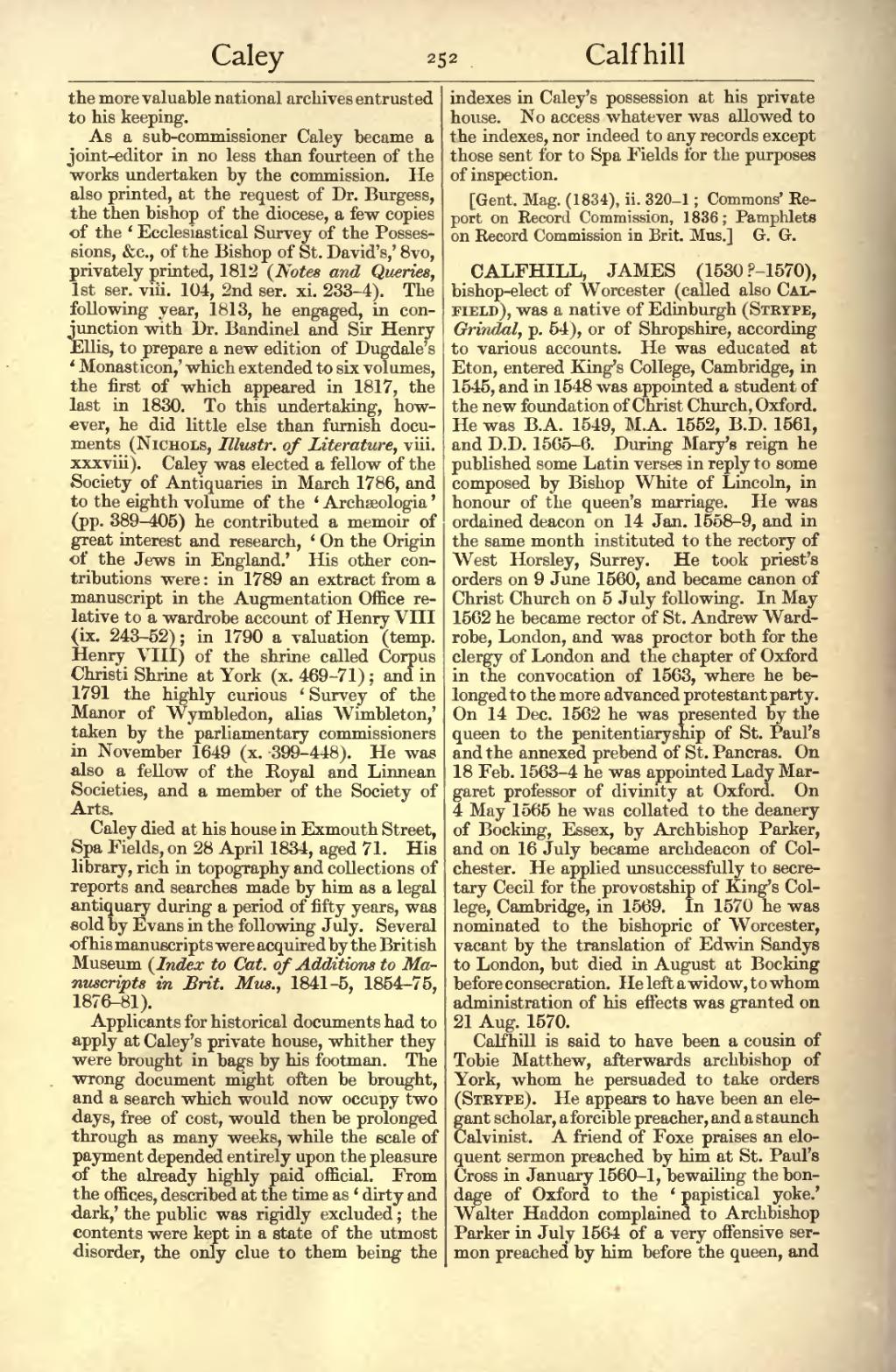the more valuable national archives entrusted to his keeping.
As a sub-commissioner Caley became a joint-editor in no less than fourteen of the works undertaken by the commission. He also printed, at the request of Dr. Burgess, the then bishop of the diocese, a few copies of the ‘Ecclesiastical Survey of the Possessions, &c., of the Bishop of St. David's,’ 8vo, privately printed, 1812 (Notes and Queries, 1st ser. viii. 104, 2nd ser. xi. 233–4). The following year, 1813, he engaged, in conjunction with Dr. Bandinel and Sir Henry Ellis, to prepare a new edition of Dugdale's ‘Monasticon,’ which extended to six volumes, the first of which appeared in 1817, the last in 1830. To this undertaking, however, he did little else than furnish documents (Nichols, Illustr. of Literature, viii. xxxviii). Caley was elected a fellow of the Society of Antiquaries in March 1786, and to the eighth volume of the ‘Archæologia’ (pp. 389–405) he contributed a memoir of great interest and research, ‘On the Origin of the Jews in England.’ His other contributions were: in 1789 an extract from a manuscript in the Augmentation Office relative to a wardrobe account of Henry VIII (ix. 243–52); in 1790 a valuation (temp. Henry VIII) of the shrine called Corpus Christi Shrine at York (x. 469–71); and in 1791 the highly curious ‘Survey of the Manor of Wymbledon, alias Wimbleton,’ taken by the parliamentary commissioners in November 1649 (x. 399–448). He was also a fellow of the Royal and Linnean Societies, and a member of the Society of Arts.
Caley died at his house in Exmouth Street, Spa Fields, on 28 April 1834, aged 71. His library, rich in topography and collections of reports and searches made by him as a legal antiquary during a period of fifty years, was sold by Evans in the following July. Several of his manuscripts were acquired by the British Museum (Index to Cat. of Additions to Manuscripts in Brit. Mus., 1841–5, 1854–75, 1876–81).
Applicants for historical documents had to apply at Caley's private house, whither they were brought in bags by his footman. The wrong document might often be brought, and a search which would now occupy two days, free of cost, would then be prolonged through as many weeks, while the scale of payment depended entirely upon the pleasure of the already highly paid official. From the offices, described at the time as ‘dirty and dark,’ the public was rigidly excluded; the contents were kept in a state of the utmost disorder, the only clue to them being the indexes in Caley's possession at his private house. No access whatever was allowed to the indexes, nor indeed to any records except those sent for to Spa Fields for the purposes of inspection.
[Gent. Mag. (1834), ii. 320–1; Commons' Report on Record Commission, 1836; Pamphlets on Record Commission in Brit. Mus.]
CALFHILL, JAMES (1530?–1570), bishop-elect of Worcester (called also Calfield), was a native of Edinburgh (Strype, Grindal, p. 54), or of Shropshire, according to various accounts. He was educated at Eton, entered King's College, Cambridge, in 1545, and in 1548 was appointed a student of the new foundation of Christ Church, Oxford. He was B.A. 1549, M.A. 1552, B.D. 1561, and D.D. 1565–6. During Mary's reign he published some Latin verses in reply to some composed by Bishop White of Lincoln, in honour of the queen's marriage. He was ordained deacon on 14 Jan. 1558–9, and in the same month instituted to the rectory of West Horsley, Surrey. He took priest's orders on 9 June 1560, and became canon of Christ Church on 5 July following. In May 1562 he became rector of St. Andrew Wardrobe, London, and was proctor both for the clergy of London and the chapter of Oxford in the convocation of 1563, where he belonged to the more advanced protestant party. On 14 Dec. 1562 he was presented by the queen to the penitentiaryship of St. Paul's and the annexed prebend of St. Pancras. On 18 Feb. 1563–4 he was appointed Lady Margaret professor of divinity at Oxford. On 4 May 1565 he was collated to the deanery of Bocking, Essex, by Archbishop Parker, and on 16 July became archdeacon of Colchester. He applied unsuccessfully to secretary Cecil for the provostship of King's College, Cambridge, in 1569. In 1570 he was nominated to the bishopric of Worcester, vacant by the translation of Edwin Sandys to London, but died in August at Bocking before consecration. He left a widow, to whom administration of his effects was granted on 21 Aug. 1570.
Calfhill is said to have been a cousin of Tobie Matthew, afterwards archbishop of York, whom he persuaded to take orders (Strype). He appears to have been an elegant scholar, a forcible preacher, and a staunch Calvinist. A friend of Foxe praises an eloquent sermon preached by him at St. Paul's Cross in January 1560–1, bewailing the bondage of Oxford to the ‘papistical yoke.’ Walter Haddon complained to Archbishop Parker in July 1564 of a very offensive sermon preached by him before the queen, and
